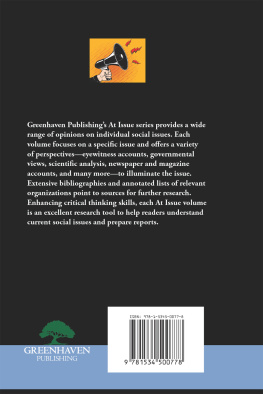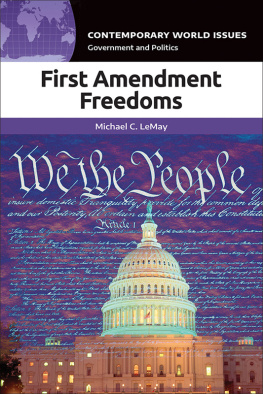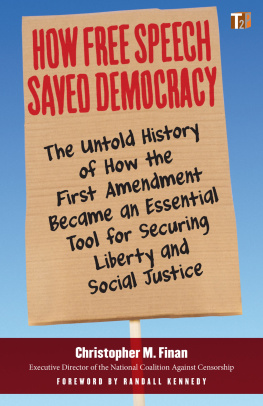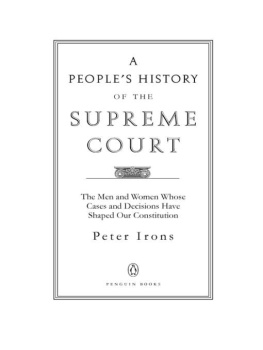This book is really an eye-opener. If you care about freedom of speech, Bill Turners book is a must-read. He clearly lays out an alarming Roberts Court pattern to abuse the First Amendment to achieve a conservative outcome.
Barbara Boxer, former US Senator and co-host of The Boxer Podcast
Justice Elena Kagan wrote of the conservatives weaponizing the First Amendment. Bill Turner tells us what this means and why it ultimately is about empowering corporations and the religious right. In a very clear, accessible book, he has sounded an alarm that we must heed.
Erwin Chemerinsky, Dean and Jesse H. Choper Distinguished Professor of Law, University of California, Berkeley School of Law
In this excellent and timely book, William Bennett Turner shows us how our current Supreme Court has, case by case, reshaped First Amendment protection for free speech, to the benefit of corporations, special interests, and conservative causes. Free Speech for Some is lucid, judicious, and brimming with authoritative insights into this troubling development.
Thelton E. Henderson, former Chief Judge, United States District Court
Bill Turner has turned his unique experience as litigator, teacher, and journalist into a masterful scholarly but eminently readable analysis of the Supreme Courts use of the First Amendment to advance a conservative political agenda. Rare is a book about law so jargon free.
Michael Meltsner, Matthews University of Professor of Law at Northeastern School of Law and author of The Making of a Civil Rights Lawyer
The First Amendment was intended to protect the dissidentthe little guyfrom the heavy hand of the government, but Turner shows how the recent Supreme Court has weaponized it on behalf of corporate interests. The court has equated corporations with people, treated money like speech, and forced ordinary Americans to fight an uphill battle. This is the kind of book that will make you angry and energized.
Bill Petrocelli, author of Through the Bookstore Window and co-owner of Book Passage bookstore

Published by Makenolaw Press
Copyright 2019, 2020 William Bennett Turner
Printed in the United States of America.
All rights reserved. Reproduction, modification, storage in a retrieval system or retransmission, in any form or by any means, electronic, mechanical or otherwise, for reasons other than personal use, is strictly prohibited without written permission.
ISBN: 978-0-5787474-1-5 (e-book)
To the memory of Anthony Lewis, Supreme Court scholar, columnist, mentor, and inspiration
CONTENTS
A Business-Friendly First Amendment:
Curtailing Government Regulation in the Name of Free Speech
A PERSONAL NOTE
We all say we believe in free speech, at least when it is our own or it expresses a point of view we agree with. When it is an idea that we loathe, our commitment may waver. My own commitment to the freedom of speech grew with my experience as a First Amendment lawyer, as a teacher, as a sometimes journalist, and, above all, as a citizen.
As a Lawyer
When I was a young civil rights lawyer working at the NAACP Legal Defense Fund in the late 1960s and early 1970s, besides school desegregation, employment discrimination, and fair housing cases, I happened into a newly developing area of the law: prisoners rights. While this was before the mass incarceration era, prisons notoriously held a disproportionate number of African Americans, and the fund viewed establishing some minimal rights for prisoners as a logical extension of the civil rights movement. The problem was, at the time, most courts took a hands-off attitude toward prisoners complaints, refusing to interfere with the discretion of prison officials. This most despised minorityprisonershad virtually no rights a court would respect or enforce. But some of their claims (e.g., unspeakably barbaric conditions, denial of religious worship) could not be ignored. I handled the first prison-conditions case in the country to go to a full trial, and that earned me pen pals from lockups near and far. I ended up representing prisoners in several states in constitutional litigation against prison-system conditions and rules.
The first case I argued in the US Supreme Court involved California prison rules that prohibited prisoners, in their letters to family and friends, from unduly complaining, magnifying grievances, or saying anything otherwise inappropriate. A prisoner wrote to our office saying he had been disciplined for violating these rules and asking if the rules were consistent with the First Amendment. I hoped not, but this had never been decided by a court. We sued. The court unanimously held the rules unconstitutional. My career as a free speech lawyer was launched.
I argued two other cases in the court, wrote the briefs and strategized on many more, and argued lots of cases in various federal courts of appeals and state supreme courts. Over the years, I was able to attract clients who were not incarcerated, a few of whom could actually pay a fee. Most of the cases were on behalf of nonprofit organizations and eccentrics whose cases were of little interest to lawyers intent on making a lot of money. But I believed the cases presented significant free speech issues. For example, I represented a gay newspaper whose news racks were raided and emptied by police on orders of the chief of police who had been caricatured on the papers front page; a public television station seeking to televise the first California execution in a generation; Wired magazine when it was sued for libel by an abusive cult leader; a federal convict punished for writing columns published by the San Francisco Chronicle; local newspapers subjected to libel claims; and an edgy political website challenging a federal law against indecent online content.
Through this work I came to appreciate the judges who were open minded and courageous enough to protect speech that the majority of citizens found distasteful or despicable and the judges who treated the freedom of speech as politically neutral, protective of Nazis, antiwar activists, religious fanatics, and civil rights demonstrators alike, allowing the powerless as well as the powerful to have their sayand to be heard. Not free speech for some, but for all.
As a Teacher
For thirty-four years, I taught courses on freedom of speech and the press at the University of California, Berkeley, the cradle of the Free Speech Movement. I taught thousands of undergraduates and graduate journalism students what I know about the First Amendment. Every year I learned something new from my students and about free speech principles. Some students started the course with preconceived notions that the law is deadly dull, consisting of rules to memorize. A few believed free speech is an absolute. Or they believed the opposite: government should suppress unpatriotic speech, hate speech, deliberate lies, speech alleged to threaten national security, or speech that causes emotional distress. After reading some of the classic casesfor example, New York Times v. Sullivan and the Pentagon Papers caselightbulbs went on. These cases are gifts that do not stop giving. Students began to appreciate that we are one of the few countries in the world to enjoy these freedoms, which we owe to Supreme Court decisions.
As a Journalist
In the late 1970s and early 1980s, while still practicing law, I was the legal correspondent for KQED, the public broadcasting station in San Francisco. (I had also represented the station in a case in the Supreme Court.) When a Supreme Court decision came down, the station would send wire copy about the decision to my law office; I would try to make sense of it, write a script, and then hop on my bike to go to the studio to air my report on the news of the day. I also worked on investigative stories on legal controversies, as well as ten or so documentaries on the courts and a four-hour series on PBS on the bicentennial of the Constitution. Hanging around and working with journalists at the station, I learned how professionals care about finding the truth and telling it (no fake news here) and what freedom of the press means in practice.






